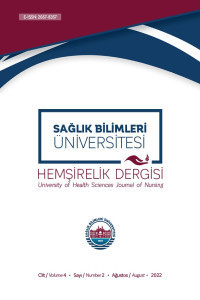Hemşirelik Bölümü Öğrencilerinin Akran Eğitimi Hakkındaki Görüşleri: Bir Vakıf Üniversitesi Örneği
Akran grubu, eğitim, hemşirelik, öğrenciler
Views on Peer Education of Nursing Students: An Example of a Foundation University
Eduation, nursing, peer group, students,
___
- Abaan, S., Duygulu, S., Uğur, E. (2012). Peer Mentoring: A Way of Developing Internal Locus of Control to Empower New Nursing Students. Sağlık Bilimleri Hemşirelik Dergisi, 24-35.
- Alp, H. (2015). Okul Öncesi Dönemdeki Çocukların Saldırgan Davranışları ve Sosyalleşme Süreçlerine Akran Eğitimi ve Oyun Etkinliklerinin Etkisi. International Journal of Social Sciences and Education Research, 2(2), 788-813.
- Altundağ Dündar, S. (2012). Tip 1 Diyabetli Adölesanların Hastalığa Uyumunda Akran Etkileşimi ve Grup Eğitiminin Etkisi. Doktora Tezi.
- Aşçı, Ö., Gökdemir, F., & Çiçekoğlu, E. (2016). Hemşirelik Öğrencilerine Akran Eğiticiler ile Verilen Üreme Sağlığı Eğitiminin Etkinliği. Sağlık Bilimleri ve Meslekleri Dergisi, 3(3), 173-183.
- Ayaz, S., & Açıl, D. (2015). Comparison of peer education and the classic training method for school aged children regarding smoking and its dangers. Journal of pediatric nursing, 30(3), e3-e12.
- Blanch, S., Duran, D., Flores, M., & Valdebenito, V. (2012). The effects of a peer tutoring programme to improve the reading comprehension competence involving primary students at school and their families at home. Procedia-Social and Behavioral Sciences, 46, 1684-1688.
- Blowers, S., Ramsey, P., Merriman, C., & Grooms, J. (2003). Patterns of peer tutoring in nursing. Journal of Nursing Education, 42(5), 204-211.
- Breithaupt, L., Eickman, L., Byrne, C. E., & Fischer, S. (2017). Enhancing empowerment in eating disorder prevention: Another examination of the REbeL peer education model. Eating behaviors, 25, 38-41.
- Bryer, J. (2011). Peer tutoring program for academic success of returning nursing students. The Journal of the New York State Nurses' Association, 43(1), 20-22.
- Çövener, Ç., Ocakçı, A. F., & Yükseokulu, K. Ü. H. (2013). Tip 1 Diyabet Yönetimi: Bir Hemşirelik Modeli Örneği. Hemşirelikte Eğitim ve Araştırma Dergisi, 10, 30-7.
- Dickinson, D. (2006). Fighting for life: South African HIV/AIDS peer educators as a new industrial relations actor?. British Journal of Industrial Relations, 44(4), 697-717.
- Gazula, S., McKenna, L., Cooper, S., & Paliadelis, P. (2016). A systematic review of reciprocal Peer Tutoring within tertiary health profession educational programs. Health Professions Education, 3(2), 64-78.
- Gill, D., Parker, C., Spooner, M., Thomas, M., Ambrose, K., & Richardson, J. (2006). Tomorrow's doctors and nurses: peer assisted learning. The Clinical Teacher, 3(1), 13-18.
- Gölbaşı, Z., Doğaner, G., & Erbaş, N. (2012). 6-8. sınıf adolesan kızlara akran eğitimi yöntemiyle uygulanan menstruasyon sağlığı eğitiminin bilgi ve davranışlar üzerindeki etkisi. TAF Preventive Medicine Bulletin, 11(2), 191-198.
- Gwozdz, W., Sousa-Poza, A., Reisch, L. A., Bammann, K., Eiben, G., Kourides, Y., ... & Vyncke, K. (2015). Peer effects on obesity in a sample of European children. Economics & Human Biology, 18, 139-152.
- Hamrin, V., Weycer, A., Pachler, M., & Fournier, D. (2006). Evaluation of peer-led support groups for graduate nursing students. Journal of Nursing Education, 45(1), 39.Kırmızıtoprak, E., & Şimşek, Z. (2011). Cinsel yolla bulaşan hastalıklar ve güvenli cinsel yaşam konusunda gençlerin bilgi ve davranışlarına akran eğitiminin etkisi. TSK Koruyucu Hekimlik Bülteni, 10(4), 463-472.
- Korkmaz, M., & Kiran-Esen, B. (2012). The Effects of Peer-Training about Secure Internet Use on Adolescents. Turkish Psychological Counseling & Guidance Journal, 4(38).
- Leung, K. C. (2015). Preliminary empirical model of crucial determinants of best practice for peer tutoring on academic achievement. Journal of Educational Psychology, 107(2), 558-579.
- MacPherson, S. L., Joseph, D., & Sullivan, E. (2004). The benefits of peer support with diabetes. Blackwell Publishing Ltd, In Nursing forum, 39(4), 5.
- Marotta, L. (2017). Peer effects in early schooling: Evidence from Brazilian primary schools. International Journal of Educational Research, 82, 110-123.
- Pålsson, Y., Mårtensson, G., Swenne, C. L., Ädel, E., & Engström, M. (2017). A peer learning intervention for nursing students in clinical practice education: A quasi-experimental study. Nurse Education Today, 51, 81-87.
- Shenderovich, Y., Thurston, A., & Miller, S. (2016). Cross-age tutoring in kindergarten and elementary school settings: A systematic review and meta-analysis. International Journal of Educational Research, 76, 190-210.
- Simsek, Z., & Kırmızıtoprak, E. (2013). Mevsimlik Tarım İşçisi Gençlerin Sağlıklı Yaşam Bilgi ve Davranışlarına Akran Eğitiminin Etkisi. Turkish Journal of Public Health, 11(1), 1.
- Steginga, S. K., Pinnock, C., Gardner, M., & Dunn, J. (2005). Evaluating peer support for prostate cancer: the Prostate Cancer Peer Support Inventory. BJU international, 95(1), 46-50.Yaslı, G., Horasan, G. D., & Bati, H. (2012). Gençlerde sigaradan korunma konusunda akran eğitimi programının etkinliği. Turkish Journal of Public Health, 10(2), 59.
- Yava, A., & Çiçek, H. S. (2016). Hemşirelik Eğitiminde Yeni Bir Yaklaşım: Akran Koçluğu A New Approach In Nursing Education: Peer Coaching. Hacettepe Üniversitesi Hemşirelik Fakültesi Dergisi, 3(1), 65-71.
- Yelpaze, İ., & Özkamalı, E. (2015). Akran Aracılı Sosyal Beceri Eğitimi Programının 6-7-8. Sınıf Öğrencilerinin Saldırganlık Düzeylerine Etkisi. University of Gaziantep Journal of Social Sciences, 14(2), 499-511.
- Yeniçeri, N., Özçakar, N., Mevsim, V., & Güldal, D. (2003). Kliniğe giriş uygulamalarında yeni bir yöntem: akran eğitimi [A new method in clinical practice introduction: peer education]. Tıp Eğitimi Dünyası [Medical Education World], 12, 6-11.
- Yayın Aralığı: Yılda 3 Sayı
- Başlangıç: 2019
- Yayıncı: Sağlık Bilimleri Üniversitesi
Hatice AYHAN, Fatma İlknur ÇINAR, Sibel YILMAZ ŞAHİN, Ayla DEMİRTAŞ, Yasemin ÖZKAN, Emel KÜLEKÇİ, Özgü BAKÇEK, Rumeysa ÖZÇELİK, Gülfaden AKKOÇ, Serpil ATEŞ, Emine İYİGÜN
Hemşirelik Bölümü Öğrencilerinin Akran Eğitimi Hakkındaki Görüşleri: Bir Vakıf Üniversitesi Örneği
Kardiyovasküler Cerrahi Sonrası Yoğun Bakımda Yaşanan Sorunlar ve Hemşirelik Bakımı
Tuğba ÇAM YANIK, Seher GÜRDİL YILMAZ
Hemşirelik Öğrencilerinde Ahlaki Olgunluk ve Etik Duyarlılığın Değerlendirilmesi
Emine BAYRAK AYKAN, Berna EREN FİDANCI, Dilek YILDIZ
Didem KURAP ÖCEBE, Merve KOLCU, Kadriye UZUN
Hemşirelikte Yapısal ve Psikolojik Güçlendirme Uygulamalarının Karşılaştırmalı Değerlendirmesi
Dr. Besim Ömer Paşa’nın Nevsâl-i Âfiyet’inde Mekteb-i Tıbbiye-i Şahane
Latino Alzheimer's Caregiving: Neither a Burden nor a "Carga"
